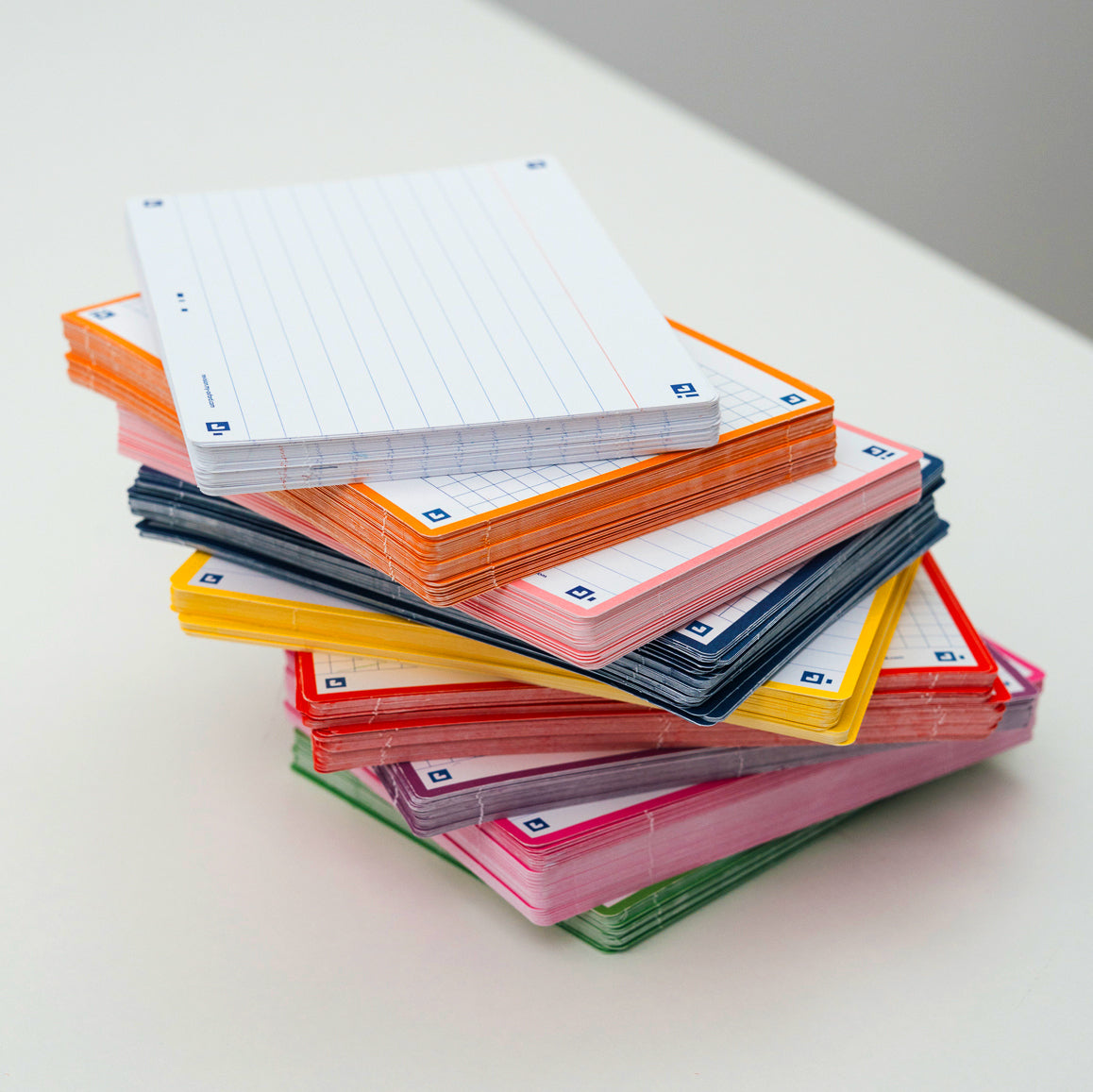It’s that time of year again: the dreaded mock exams. So many students fear when November rolls around, knowing that you’re about to see how you really react to exam conditions. But lucky for you, mock exams are nothing to be afraid of if you prepare well in advance.
One of the best ways to do that? Flash cards, flash cards, and more flash cards! As one of the most powerful tools in your revision toolkit, flash cards are perfect for memorising and truly understanding what you’re learning. They’re portable, flexible, and great for active recall – particularly our Oxford flash cards which are compatible with the Scribzee app.
But here’s the secret: flash cards only work well if they’re organised well.
Not sure where to start? Let’s take a look at how to make, manage, and master your flash cards for exam success.
1. Making Quality Flash Cards 🧠
Before worrying about organisation, making sure your cards are effective for revision should be your first step.
Some tips for creating great flash cards:
-
Keep one concept per card – try to avoid cramming multiple facts onto one card as this impacts your active recall.
-
Ask one clear and concise question. For example:
❌ “All the events of Henry VIII’s reign”
✅ “What were the reasons for Henry VIII’s divorce from Catherine of Aragon?”
-
Write your flash cards using your own words, not out of a book.
-
Add pictures, diagrams, symbols and colour to help you remember.

2. Organising by Subject, Topic and Subtopic 🎨
This one may seem simple, but it’s probably the most common way of getting your flash cards organised. Depending on how you study with flash cards, you may want to start by organising each subject into card decks on your desk. From here, you can split out into topics, units, or sub-topics to target specific areas of your revision. Here are some ways of organising:
-
By colour: each subject has a different colour flash card assigned to it, making it easy when you come to do your revision.
-
Using symbols: if you don’t have multi-coloured flash cards, creating your own system of symbols can also be a great way of distinguishing which subject is which. Draw a small symbol in the corner of your card, and don’t forget to write out a key.
-
Highlighting: like colour coding, you can also highlight your revision cards in different colours for each subject and topic. We have a range of highlighters on our website from vibrant brights to cool pastels perfect for the job.

3. The Lietner Method 📦
Perhaps one of the best ways of mastering flash card revision, the Lietner method is ideal to quickly identify which topics you struggle with the most. Our Oxford Flashbox is designed with this method in mind. The five compartments of the Flashbox allows you to organise your revision in a nice compact storage box. Here’s how to use it:
-
Place your cards in the first compartment, then draw them out one by one to test yourself.
-
Any cards you give the correct answer can move to the next compartment, and any you get wrong remain in the first compartment.
-
Continue this until all cards are in the fifth and final compartment, meaning you have mastered your revision!
-
Then start again with a different subject.
The great thing about this method is that it challenges your active recall and memory. The Oxford Flashbox ensures that you are repeating questions enough times to embed the answers in your long-term memory. Plus, the Oxford Flashbox stores up to 500 cards, making sure your desk remains tidy throughout the revision season.

4. Review your Flash Cards Regularly 🗓️
Once you’ve made and organised your flash cards, it can be really easy to get too comfortable with them. You might feel you master them within a week and are no longer challenged by the questions.
Organising flash cards is also about maintaining them. There’s no point to having beautifully laid out cards if they aren’t helping you revise efficiently. So, set aside fifteen minutes a week to tidy and update your revision cards. Here are some of the things to look out for:
-
Removing outdated or irrelevant cards
-
Re-wording questions to test recall
-
Re-writing unclear cards
-
Adding new cards from recent lessons
-
Re-organising decks based on what exams are coming up
Don’t forget to add any new or adapted flash cards to your Scribzee account so you can revise on the go!
(Top Tip: you can also share your flash cards with friends on the app so you can all ace the content together!)
✨ Final Thoughts
Organising your flashcards is about more than neatness — it’s about creating a study system you can trust. When everything has a place and a purpose, you can focus entirely on learning, not finding what to learn.
So take an hour this week to sort, label, and store your cards properly.
Future You — sitting in that exam hall, confident and prepared — will be very grateful.
Love our blogs? Sign up to receive emails from us to get notified when a new one drops, as well as be the first to know about exclusive deals and promotions coming up!

